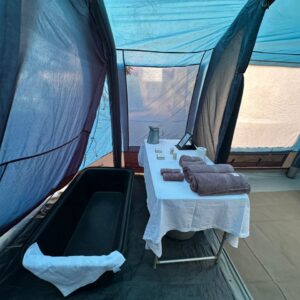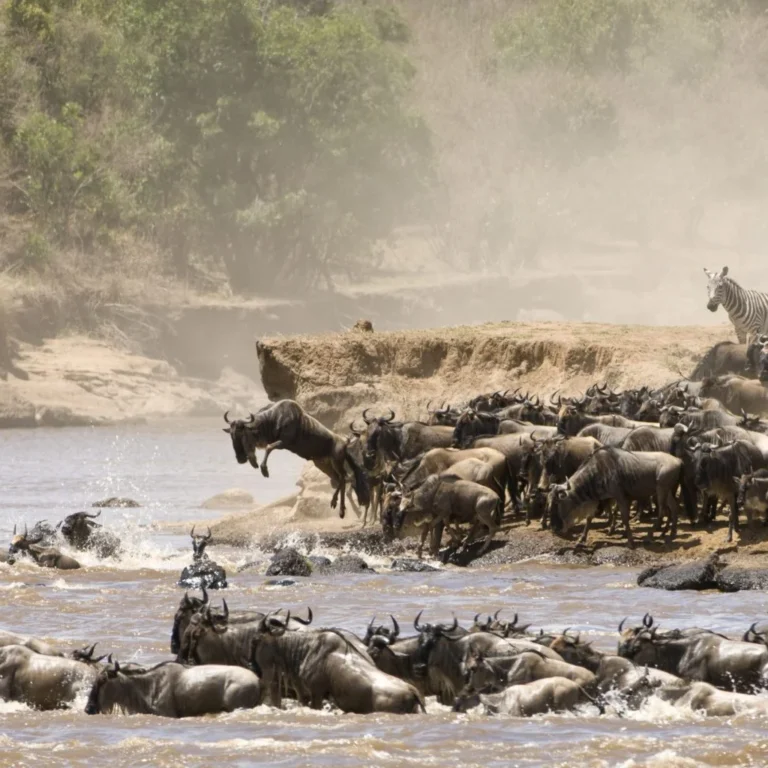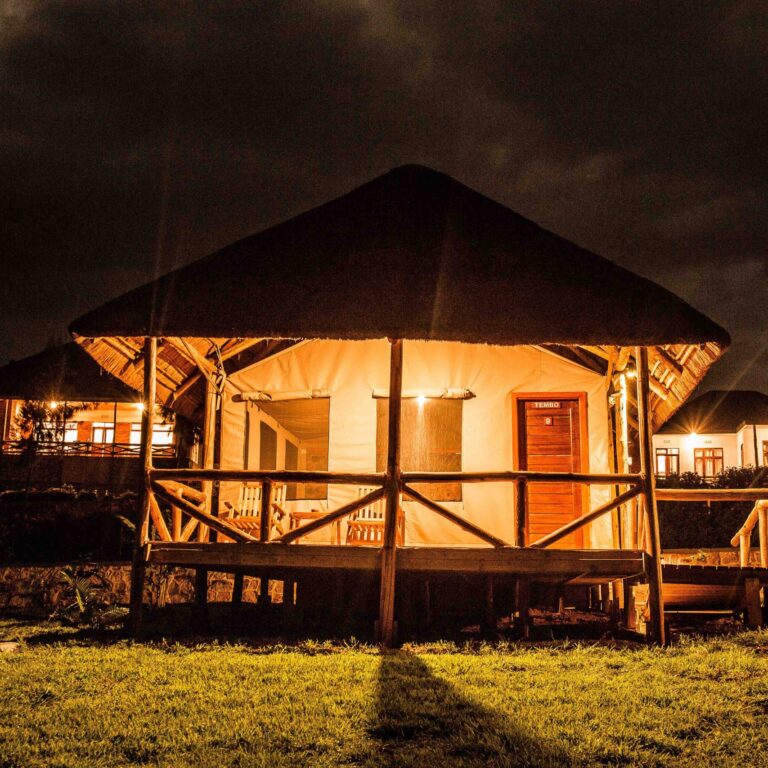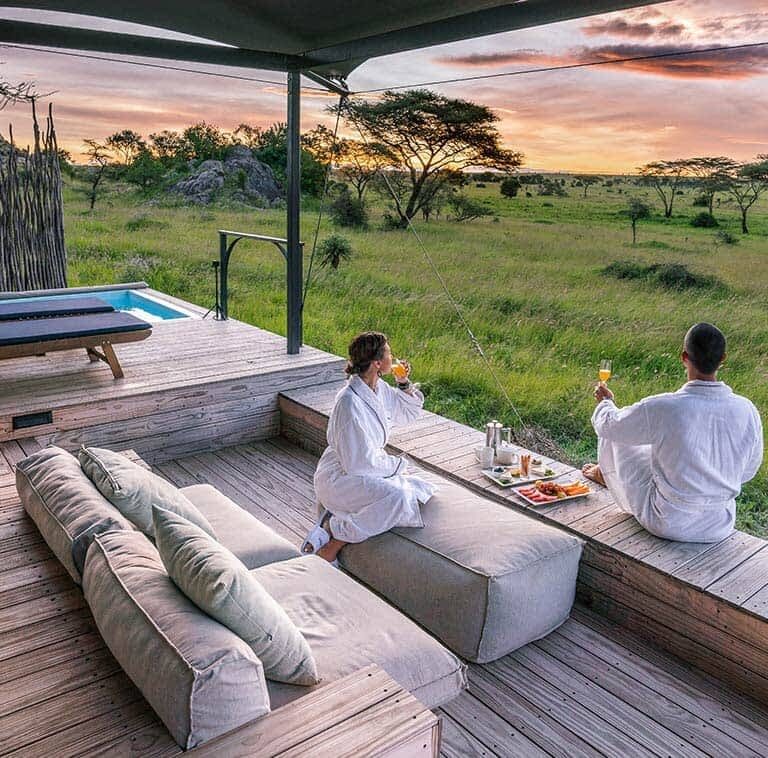Taking babies and toddlers on an African safari may sound ambitious, but with thoughtful planning, it can become one of the most meaningful family adventures you will ever share. Tanzania, with its warm hospitality, stable tourism infrastructure, and breathtaking wildlife, is particularly well-suited for young families. From the elephant-filled plains of Tarangire National Park to the iconic wildlife haven of Serengeti National Park and the dramatic beauty of Ngorongoro Crater, Tanzania offers unforgettable safari experiences that can be adapted to little travelers.
Taking babies and toddlers on an African safari requires careful planning, focusing on malaria-free, fenced, family-friendly lodges with private vehicles for flexible, shorter game drives. Prioritize safety by keeping kids in vehicles, using carriers, packing extensive supplies (formula, snacks), and ensuring vaccinations. Key tips include mixing safari with beach relaxation and maintaining routines. Here is your complete, realistic, and practical guide to doing it right.
Choosing the Best Safari Destinations for Young Families
When traveling with babies and toddlers, location matters more than ever. Tanzania’s northern circuit offers the best balance of wildlife, accessibility, and comfort. Tarangire National Park is ideal for shorter game drives and large elephant herds close to the road. Ngorongoro Crater provides concentrated wildlife viewing in a compact area, reducing long driving hours. Lake Manyara National Park is smaller, scenic, and manageable with little ones.
For families wanting iconic plains without excessive travel, the central Serengeti National Park works well when accessed by short flights instead of long road transfers. Staying within well-developed safari regions ensures better medical access, smoother roads, and family-friendly lodges.
Choosing parks closer together reduces travel fatigue — a key factor when traveling with toddlers. Tanzania’s wildlife density means you do not need to drive far to see elephants, giraffes, zebras, and lions. Less driving, more sightings, and comfortable infrastructure make northern Tanzania the most practical and rewarding choice for young families.
Selecting the Right Lodges
Not all safari lodges are suitable for babies and toddlers. The right property makes the entire experience smoother. Look for lodges offering family suites, interconnected tents, or private villas. Space matters — you need room for naps, early bedtimes, and playtime. Choose accommodations with flexible meal times, high chairs, and staff comfortable around children. Some lodges provide babysitting services, allowing parents to enjoy short game drives or bush dinners. Properties with swimming pools (securely fenced) offer midday relaxation when wildlife activity slows. Proximity to airstrips reduces transfer time. Ground-level tents are preferable to elevated platforms. Confirm whether the lodge allows children on game drives, as some camps have age restrictions. Luxury is helpful, but practicality is essential — shaded verandas, calm environments, and attentive staff make a difference. The right lodge becomes a haven between adventures, giving parents confidence and toddlers space to adjust to the wild surroundings.
Health and Safety Considerations
Health preparation is critical when traveling with little ones. Consult your pediatrician well in advance regarding vaccinations and malaria prevention suitable for infants and toddlers. Carry prescribed medications, fever reducers, rehydration salts, and a digital thermometer. Choose lodges with mosquito nets, screened windows, and good hygiene standards. Dress children in lightweight long sleeves during evenings. Apply child-safe insect repellent as advised by your doctor. Travel insurance covering emergency evacuation is strongly recommended. In northern Tanzania, medical facilities are accessible in Arusha, but remote parks require preparedness. Hydration is essential — offer bottled or purified water only. Maintain regular nap and feeding schedules as much as possible to avoid exhaustion. With proper planning, safaris are safe for families. Reputable safari operators prioritize safety protocols, experienced guides, and well-maintained vehicles. Preparation does not remove adventure — it simply allows you to relax and fully enjoy the experience.
Planning a Toddler-Friendly Safari Itinerary
A slower pace transforms a safari with toddlers. Limit long road journeys and consider short domestic flights between parks. Plan two to three nights per location to avoid constant packing and unpacking. Schedule shorter game drives — one in the early morning and one late afternoon — returning to the lodge for lunch and naps. Avoid overly ambitious park combinations. Quality sightings matter more than the quantity of destinations. Build flexibility into each day. If your toddler needs extra rest, adjust the schedule without pressure. Private safaris are highly recommended because they allow you to return to camp at any time. Choose destinations close together to minimize travel fatigue. Balance wildlife viewing with downtime at the lodge. A relaxed rhythm ensures children remain happy — and happy children mean relaxed parents.
What to Pack for Babies and Toddlers on Safari
Packing wisely ensures comfort in changing safari conditions. Bring lightweight cotton clothing, long sleeves for evenings, sun hats, and comfortable walking shoes. Temperatures can shift dramatically between early mornings and midday heat. Essentials include diapers, wipes, baby toiletries, favorite snacks, formula, bottles, and comfort items like a favorite blanket or toy. While some supplies are available in Arusha, remote parks offer limited options. A compact stroller works in lodges but not in the bush — a baby carrier is more practical. Include sunscreen (child-safe), insect repellent approved for infants, and basic medications. Don’t forget entertainment for downtime: small books, coloring materials, or quiet toys. Pack conservatively but thoroughly. Having familiar items from home helps toddlers feel secure in a new environment filled with unfamiliar sights and sounds.
Managing Game Drives with Little Ones
Game drives with toddlers require patience and flexibility. Private vehicles are strongly recommended, allowing you to shorten drives or return to camp when needed. Keep drives brief — two to three hours is often enough. Bring snacks, water, and quiet toys. Position your child comfortably with appropriate sun protection. Wildlife sightings are unpredictable, so celebrate small moments — a herd of elephants crossing the road or giraffes feeding nearby. Guides experienced with families understand when to adjust pace and minimize long waits. Avoid peak heat hours and focus on cooler morning or late afternoon drives. If one parent wishes to take a longer drive, the other can stay behind with the child — alternating works well. Flexibility transforms potential stress into joy. The goal is not to see everything, but to share the magic of the wild.
Dealing with Wildlife Sounds at Night
The African night is alive with sound — distant lion roars, hyenas calling, and rustling grass. For toddlers, this can be unfamiliar and occasionally unsettling. Prepare your child by explaining that the sounds are animals talking to each other. Keep a calm tone — children mirror parental reactions. Bringing a familiar bedtime routine helps maintain comfort. Many lodges provide secure tents with solid flooring and attentive night staff escort services. White noise apps or soft music can help children sleep through unfamiliar sounds. Reassure your toddler if they wake at night. Within a day or two, most children adapt and sleep peacefully. What feels wild at first often becomes magical — those nighttime sounds are part of the authentic safari experience and quickly turn into cherished memories.
When Is the Best Time to Go
The best time for a safari with babies and toddlers is during the dry season, typically June to October. Wildlife gathers near water sources, making sightings easier without long drives. Roads are also more accessible. Green season (November to March) offers lush landscapes and fewer tourists but may involve occasional rain showers. Avoid peak heat months if traveling with infants sensitive to high temperatures. Shoulder seasons can provide a balance between good wildlife viewing and moderate weather. Ultimately, timing should align with your family’s comfort and routine. Wildlife in Tanzania is present year-round, so there is no “wrong” time — only the time that works best for your family’s needs.
Realistic Expectations Make the Difference
A safari with toddlers is not the same as an adult adventure — and that is perfectly fine. You may not track every predator or spend hours waiting for dramatic wildlife moments. Instead, focus on shared experiences: your child pointing at zebras, laughing at monkeys, or watching elephants splash water. Small discoveries become big memories. Patience is essential. Toddlers may become tired or restless. Adjust the schedule accordingly. Let go of rigid plans and embrace flexibility. The goal is not perfection but connection — with nature and with each other. When expectations are realistic, the safari becomes joyful rather than stressful.
Combine with Relaxation
Balancing safari adventure with downtime enhances the experience. After several days in the bush, consider ending your trip with a beach escape in Zanzibar. Calm ocean breezes and soft sand provide space for children to play freely. Beach resorts offer swimming pools, relaxed schedules, and family-friendly facilities. Parents can unwind while toddlers explore safely. Combining wildlife and coastal relaxation prevents travel fatigue. The contrast between savannah plains and turquoise waters creates a well-rounded family holiday. This blend of adventure and rest ensures everyone — especially little ones — returns home refreshed and happy.
Choose Babies and Toddlers Friendly, Engaging Activities
Beyond game drives, many lodges offer gentle, engaging activities for young children. Short guided nature walks within lodge grounds introduce birds, butterflies, and animal tracks. Cultural visits to local communities can be arranged respectfully and briefly. Storytelling by the campfire, simple Swahili words, and wildlife-themed crafts create meaningful learning moments. Some lodges provide junior ranger programs tailored for young ages, focusing on fun and discovery rather than long excursions. Swimming, supervised lawn play, and safe open spaces allow toddlers to release energy. A safari is not only about big animals — it is about curiosity. Encouraging exploration at a child’s pace makes the experience enriching and unforgettable for the entire family.
Is it safe to take babies or toddlers on an African safari?
Yes, it can be safe to take babies or toddlers on an African safari—if you plan carefully and choose the right destinations. In Tanzania, parks like Serengeti National Park and Ngorongoro Crater offer well-managed lodges with trained guides, secure vehicles, and family-friendly accommodations. Private safaris provide flexibility for nap times and shorter game drives. Health precautions, travel insurance, child-safe lodges, and malaria guidance are essential. Many camps have age policies, babysitting services, and enclosed spaces. With proper preparation, a safari can be safe, enriching, and unforgettable for young families seeking wildlife adventures together.
Is an African Safari Suitable for Babies and Toddlers?
An African safari can be suitable for babies and toddlers with thoughtful planning. Many lodges in Tanzania and across East Africa welcome families, especially in wildlife areas like Serengeti National Park and Ngorongoro Crater. Private safaris are ideal, allowing flexible game drives, rest breaks, and adjusted schedules. Choose family-friendly lodges with spacious suites, child menus, and babysitting services. Consider travel times between parks, road conditions, and health precautions. While long drives and wildlife sounds can be overwhelming, shorter excursions and relaxed pacing make the experience enjoyable. With the right operator and preparation, a safari can be a safe, memorable family adventure.
What is the minimum age for safari activities?
The minimum age for safari activities varies by park, lodge policy, and activity type. In most Tanzanian destinations, children of all ages may join private game drives, though many lodges recommend a minimum of 5–6 years. Walking safaris often require ages 12–16+, while canoeing or night drives may have stricter limits. For safety and wildlife etiquette, some luxury camps set their own age policies. Family-friendly operators can tailor shorter drives, child-focused guides, and exclusive vehicles to ensure comfort, learning, and unforgettable safari experiences for every generation.
Are malaria precautions necessary for infants?
Yes. Malaria precautions are essential for infants traveling to or living in malaria-risk areas such as parts of Tanzania and sub-Saharan Africa. Infants have immature immune systems and can become seriously ill very quickly. Protective steps include sleeping under insecticide-treated mosquito nets, dressing babies in long sleeves and trousers at dusk, and using age-appropriate mosquito repellents as advised by a pediatrician. In high-risk regions, doctors may prescribe infant-safe antimalarial prophylaxis based on weight and age. Parents should also ensure prompt medical attention for any fever. Prevention is far safer than treatment, especially for young children.
What accommodation is best for families with toddlers?
For families with toddlers, the best accommodation combines safety, convenience, and comfort. Look for spacious family rooms or suites with separate sleeping areas, childproofed interiors, and easy access to bathrooms. Resorts or lodges with kid-friendly amenities—like high chairs, cribs, shallow pools, playgrounds, and babysitting services—make daily routines easier. On-site restaurants with flexible menus and flexible meal times help mealtimes run smoothly. Proximity to attractions, short transfers, and quiet surroundings ensure both exploration and restful naps. Properties offering stroller rentals, laundry services, and emergency medical access give parents peace of mind, making the stay stress-free, enjoyable, and tailored to the needs of toddlers.
How long should game drives be with small children?
When planning game drives with small children, timing is crucial for comfort and enjoyment. Typically, drives should be shorter than standard safaris—around 2 to 3 hours in the morning and/or late afternoon—avoiding the midday heat. Many lodges and tour operators tailor family-friendly safaris with flexible schedules, frequent stops, and shaded vehicles to keep little ones engaged and comfortable. Short drives also reduce restlessness and ensure children can enjoy spotting wildlife without fatigue. Snack breaks, water, and light educational activities about animals enhance the experience. Overall, pacing thoughtfully allows families to experience Tanzania’s incredible wildlife safely, comfortably, and memorably.
What should I pack for a baby on safari?
When packing for a baby on safari, prioritize comfort, safety, and convenience. Bring lightweight, breathable clothing for warm days and layers for cooler mornings and evenings. Include a wide-brimmed hat, sun-protective clothing, and baby-safe sunscreen. Essential gear includes diapers, wipes, baby food, formula, bottles, and a portable cooler. A compact stroller or baby carrier is ideal for game drives and walking safaris. Don’t forget a first-aid kit, insect repellent suitable for babies, and favorite toys or comfort items. For overnight stays, pack a portable crib or travel cot and blankets. Staying prepared ensures a smooth, enjoyable safari for both baby and parents.
Are safari vehicles child-friendly?
Safari vehicles are generally designed with safety and comfort in mind, making them suitable for children of all ages. Open-sided 4×4 jeeps or minivans offer secure seating with seat belts, easy access, and shade from the sun. Experienced guides ensure children stay safe while observing wildlife from a safe distance. Many operators provide child-friendly amenities such as booster seats, snacks, and flexible game drive durations to suit younger travelers. While adventurous, these vehicles maintain stability on rough terrain, making the experience both exciting and safe. Families can enjoy close-up wildlife encounters, educational commentary, and unforgettable safari moments tailored for kids.
Can toddlers enjoy a safari experience?
Absolutely! Toddlers can enjoy a safari experience with the right planning. While they won’t track wildlife like adults, the sights, sounds, and colors of animals like elephants, giraffes, and zebras can be captivating. Short, flexible game drives, comfortable vehicles, and frequent breaks make the adventure toddler-friendly. Interactive experiences, such as spotting animals through binoculars, storytelling about wildlife, or visiting safe, shaded picnic spots, keep them engaged. Family-focused lodges often provide child-friendly facilities and meals. With careful pacing, supervision, and safety measures, toddlers can delight in the wonder of nature, creating memorable early encounters with Africa’s spectacular wildlife.
How to Keep Kids Entertained on a Tanzania Safari?
Keeping kids entertained on a Tanzania safari combines adventure, learning, and fun. Start with interactive wildlife spotting games in parks like Tarangire and Serengeti, teaching them to identify elephants, lions, and giraffes. Engage them with Maasai cultural experiences, crafts, and storytelling for hands-on learning. Include short nature hikes in Arusha or Ngorongoro Crater, plus birdwatching and photography sessions to spark curiosity. Water-based activities at Lake Manyara or Kikuletwa Hot Springs add excitement, while guided safari drives can be made interactive with quizzes or scavenger hunts. Balancing exploration with rest ensures children remain energized, making a Tanzania safari an unforgettable family adventure.
Are your kids too young for an African safari?
Wondering if your little ones are too young for an African safari? Age is less a barrier than comfort and safety. Toddlers may struggle with long drives, early wake-ups, and bumpy terrain, while older children can fully enjoy game drives, wildlife spotting, and cultural experiences. Family-friendly lodges often offer amenities like kids’ menus, play areas, and shorter safari options. Choosing private or short excursions ensures a stress-free adventure. With the right planning, even young kids can experience the wonder of Africa’s wildlife safely, creating unforgettable memories that spark curiosity, awe, and a lifelong love for nature.
What are the tips for planning the Best African Safari with Kids?
Planning the best African safari with kids requires careful preparation for a safe, fun, and memorable adventure. Start by choosing family-friendly parks like Tarangire, Lake Manyara, or the Serengeti, which offer shorter drives and abundant wildlife. Pick comfortable lodges or tented camps with kid-focused amenities. Schedule game drives around children’s energy levels and include engaging activities like nature walks, cultural visits, or balloon safaris. Pack essentials: sun protection, snacks, binoculars, and first-aid kits. Prioritize reputable tour operators who understand family needs. Finally, involve kids in planning to spark excitement and curiosity, ensuring the safari is both educational and unforgettable for the entire family.
How Young Is Too Young for Kids to Go on an African Safari?
Deciding how young is too young for kids on an African safari depends on safety, stamina, and attention span. Toddlers may struggle with long game drives and early mornings, while children aged 6–10 can often enjoy short, guided excursions with engaging activities. Older kids, 10+, usually handle full-day safaris, appreciating wildlife, culture, and photography. Family-friendly lodges offer amenities, shaded vehicles, and flexible itineraries to ensure comfort. Consider health, vaccinations, and realistic expectations—wildlife encounters are unpredictable, and patience is key. Ultimately, the ideal age balances curiosity with endurance, ensuring a safe, memorable, and enriching safari experience for the whole family.
The ultimate family African safari guide
The Ultimate Family African Safari Guide offers an unforgettable journey through Africa’s wild wonders tailored for all ages. From spotting lions, elephants, and giraffes in Serengeti National Park, to cultural encounters with Maasai communities, every day blends adventure and learning. It covers kid-friendly safari lodges, safe game drives, engaging activities like balloon safaris, nature walks, and photography tips. Practical advice on packing, travel logistics, and health ensures stress-free family travel. Ideal for multi-generational trips, honeymooning couples with children, or first-time safari explorers, this guide balances thrill and safety, helping families create lasting memories while immersing in Africa’s spectacular wildlife and breathtaking landscapes.
How To Keep Your Children Safe on an African Safari?
Keeping children safe on an African safari requires careful planning and supervision. Always choose family-friendly lodges and vehicles with seat belts and shade protection. Educate kids on wildlife rules—never approach animals, stay inside vehicles, and follow guides’ instructions. Pack essentials like hats, sunscreen, insect repellent, and first-aid kits. Limit exposure to extreme heat, and plan shorter game drives to avoid fatigue. Ensure constant hydration and healthy snacks. Select experienced, licensed safari guides trained in child safety, and maintain clear communication about daily itineraries. With vigilance, preparation, and fun safety routines, families can enjoy thrilling wildlife experiences while keeping children secure and confident throughout the adventure.
How to plan a family-friendly safari trip to Tanzania?
Planning a family-friendly safari in Tanzania begins with choosing the right destinations: Tarangire, Lake Manyara, Serengeti, and Ngorongoro Crater offer safe, engaging wildlife experiences for all ages. Opt for child-friendly lodges with pools and family rooms. Balance game drives with interactive cultural visits, like Maasai village tours, and light nature walks. Travel during the dry season (June–October) for easier wildlife spotting. Ensure comfortable transport and short daily drives to keep kids happy. Include fun extras like balloon safaris or crater picnics. Booking through reliable, trusted tour operators guarantees safety, guidance, and a stress-free, memorable adventure for the whole family.
- Luxury Family Holidays
- The Most Amazing Tanzania Safari With Kids Experience
- Best Tanzania Family Safari
- Luxury Family Safari Offer – Africa
- A Guide to Planning Your First Tanzania Safari
Should you take children on an African safari?
Taking children on an African safari can be a magical and educational experience, but it requires careful planning. Safaris introduce kids to wildlife, nature, and different cultures, creating lasting memories and fostering curiosity. National parks like Serengeti, Tarangire, and Ngorongoro offer family-friendly lodges, guided drives, and short game-viewing excursions suitable for young travelers. Consider your child’s age, stamina, and interest in wildlife; toddlers may struggle with long drives, while older kids can fully enjoy game drives, cultural visits, and safaris on foot. With the right itinerary, safety measures, and engaging activities, a family safari can be both safe and unforgettable, blending adventure with learning.
Final Thoughts
Taking babies and toddlers on an African safari in Tanzania is entirely possible — and deeply rewarding — with thoughtful preparation. By choosing accessible parks like Tarangire, Ngorongoro, and Serengeti, selecting family-friendly lodges, prioritizing health and safety, planning shorter game drives, and building flexibility into your schedule, you create an adventure that works for every age. Your child may not remember every lion or giraffe. But you will remember their wonder. And one day, when they look back at photographs of elephants walking beneath African sunsets, they will know their love for wild places began early — in the heart of Tanzania. Kid-friendly African safari. Best African safaris with kids. The best age to take kids on safari. African safari family packages. African safari with kids. Safari holiday with a toddler. Baby on safari. Children Safari








